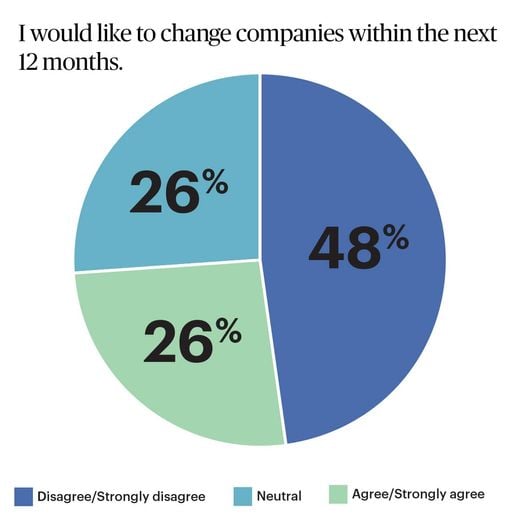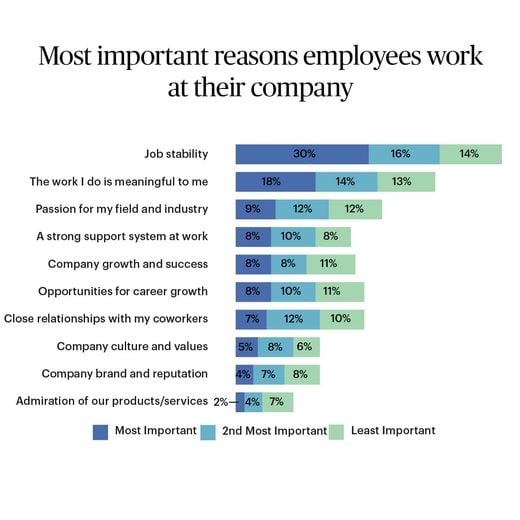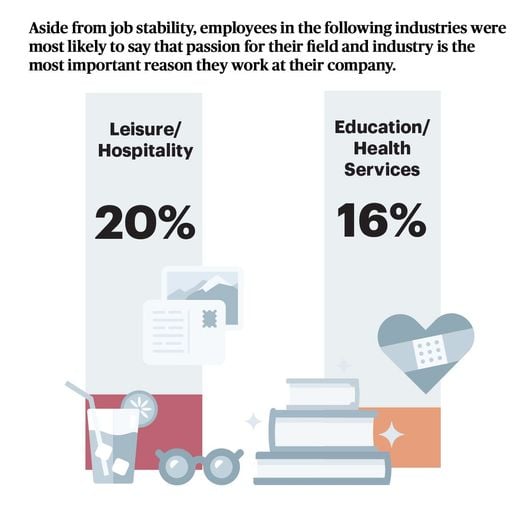- Human Resources
- Article
- 6 min. Read
- Last Updated: 07/28/2022
Employees Weigh In On What’s Important to Them and Why They Stay At Their Companies

Table of Contents
The Great Resignation may be waning as our survey found nearly half of workers are planning to stay at their companies in the next 12 months, though younger workers may still need to be convinced of the benefits of staying.
Paychex, in partnership with Executive Networks, conducted a 10-minute online survey with 604 full-time and part-time employees who were all living in the U.S., working at small to mid-sized businesses (20-500 employees), and aged between 18-75 years old. The research sample included 65% active workers and 35% sedentary workers. Active workers work on the front line of their business, while sedentary workers work at a desk for a majority of their workday. The survey also segmented by employees who work fully remote (19%), fully on-site (63%), and hybrid (18%).
Overall, job stability and performing meaningful work were cited as the two most important reasons employees continue to stay at their companies.
However, there were variations depending on working arrangements (remote/hybrid/on-site and active/sedentary), industry sector, and generation.
Here were some of the top findings:
- More Baby Boomers (46%) reported that flexibility in work hours or schedule would make them stay long-term at their organization than Gen X (38%), Millennials (31%), and Gen Z (24%).
- Sedentary workers (20%) were more likely to say flexibility in work environment would make them more likely to stay at their company long-term than active workers (11%).
- Active workers (66%) were less likely to feel valued for the work they do than sedentary workers (75%)
Key Findings: What’s Important to Workers and What Makes Them Stay with a Company
#1 Almost half of employees surveyed plan to stay with their current companies
The data could lead us to believe that workers are starting to see the value of staying with their current employer. Most agreed that they currently perform reasonable amounts of work (71%), are provided the tools they need to be successful (71%), and that they feel valued for the work they do (69%). Additionally, 48% of employees said they do not plan to change companies within the next 12 months.

Out of those who reported they would like to change companies in the next 12 months, Millennials (34%) and Gen Z (30%) were significantly more likely to say they would want to switch employers than Baby Boomers (15%) and Gen X (22%) .
Employers may already recognize this, as Gen Z (49%) and Millennials (36%) are more likely to report having a "stay interview" at their company compared to Gen X (21%) and Baby Boomers (12%). For the purposes of this study, a stay interview was defined as when an employer meets with an employee to gather information about what the employee values about their job and to discover what the employee believes can be improved.
When it comes to leaving their current company, those in professional and business services (41%); retail, trade, transportation, and utilities (35%); and construction (36%) were the most likely to say they’re interested in leaving in the next 12 months. Those in education and health services (16%), as well as those in financial services (18%) were the least likely to report wanting to change companies.
#2 Employees value companies that align with their personal interests and values
When asked to consider factors outside of compensation and benefits, the top-ranked reasons employees work at their companies were:
- Job stability
- Meaningful work
- Passion for their field of work or industry
- A strong support system
- Company growth
- Opportunities for one’s personal career growth

The lowest-ranked reasons that employees choose to stay with their company include: company culture and values, company brand and reputation, and company products/services. From this we could infer that employees are making career decisions based on their own goals and values and not those of their employer.
When asked about what perks would make employees more likely to stay long-term with their employer, respondents were most likely to rank flexibility in hours/schedules (35%), opportunities for skills development, career advancement and internal job mobility (15%) as their top picks.
However, there were some key differences when we examined these factors based on generation, industry, and working arrangements.
#3 While Baby Boomers, Gen X, and Millennials value job stability and financial wellness most when it comes to staying with their organizations, Gen Z places value on mental health benefits
Baby Boomers (32%), Gen X (35%), and Millennials (31%) were significantly more likely to say that job stability is the most important reason they work at their company than Gen Z (14%).
When asked to rank benefits (aside from higher pay), more Gen Z (23%) participants cited mental health benefits as the top benefit that would make them stay at a company long-term compared to Millennials (14%), Gen X (5%), and Baby Boomers (3%).
Baby Boomers (14%), Gen X (16%), and Millennials (14%), were also more likely to rank financial wellness benefits as their top reason for staying at a company compared to Gen Z (7%).
When asked to rank perks (aside from higher pay), more Baby Boomers (46%) reported that flexibility in work hours and scheduling would make them more likely to stay long-term at their organization than Gen X (38%), Millennials (31%), and Gen Z (24%).
#4 Failing to Consider Industry Preferences When Evaluating Employee Values May Lead to Poor Retention
Aside from job stability, employees in leisure/hospitality (20%) and education/health services (16%) were most likely to say that passion for their field and industry is the most important reason they work at their company. They were also the two industries most likely to site meaningful work as their number one reason they work at their company (20% and 25% respectively). Manufacturing (6%); retail, trade, transportation, and utilities (5%); and other services (4%) were least likely to rank passion for their field and industry as number one.

Those in financial services (29%) were most likely to cite greater company commitment to work/life balance as their top reason to stay at an organization, followed by flexible work schedules (20%), while more opportunities for skills development, career advancement, and internal job mobility came in last for this group (3%).
And, those who work in leisure/hospitality (27%), construction (24%), and professional/business services (20%) were significantly more likely to cite financial wellness benefits as the top way to encourage them stay at their employer long-term. Those who work in manufacturing (9%); education/health services (6%); and retail, trade, transportation and utilities (13%) were least likely to rank financial wellness benefits at the top.
What Employers Can Do to Retain Employees
- Look for ways to build flexibility into work schedules. Our research shows workers highly value flexibility in when they work (working hours) rather than just where they work (remote/hybrid/on-site). Employers could start by taking regular polls to uncover employee suggestions for building schedule flexibility into all types of roles, as “flexibility” can mean different things to those in different industries. However, they should first consider what the business can accommodate and tailor the questions to what is feasible before asking an open-ended question in case you do not have the ability to meet most requests. What flexibility looks like for a healthcare worker, for example, may be different from that of an office worker. Employers can also explore a range of technology solutions which allow workers to easily indicate their scheduling preferences, see upcoming shifts and initiate shift swaps (if applicable), or request time off.
- Survey employees to understand what benefits are of value to various segments of workers. As we saw in our research results, different generations place higher value on different benefits, so employers need to take an employee-centric approach to total rewards and benefits. And, if you have a mix of employees on-site, hybrid, or fully remote, it may be worth segmenting your survey results based on location so that you can offer a benefits package that addresses the needs across your workforce. Fully remote workers, for example, might prefer monthly remote work stipends to help them pay for home internet bills, while fully on-site workers might prefer access to financial wellness classes offered in person at the worksite.
- Invest in a range of opportunities for skill development and provide greater access to mentoring and coaching opportunities. Workers are looking to their employer for opportunities to broaden their skills and grow their careers. Employers could start by questioning how they are approaching their investment in training and development: what is their total investment in training and development? How are they delivering this to employees? Is it aligned to their current and future strategic business priorities? Is it easily accessible and relevant?
- Have regular check-ins or stay interviews with employees. Stay interviews are an opportunity to learn how to better engage your employees so they want to stay with your company. Rather than just interviewing employees on their way out in an exit interview, more employers need to have stay conversations with employees to receive their feedback on the workplace and what would motivate them to stay. This is especially important for younger workers who, as our research shows, are more likely than older workers to have had a stay interview, yet still want to switch companies. Employers can build regular check-ins as part of the company culture and train managers to have these on a regular basis with their teams. Stay interviews help employers learn about an employee’s career aspirations, receive feedback on what makes them want to stay with the company, and understand exactly what support and resources they need to succeed in their job.
“The future of work is creating a personalized, human experience at work. Employers should embark on active listening and conduct employee sentiment surveys, so they understand what makes an employee want to stay with their company and what changes they need to implement to increase employee retention.”
-Jeanne Meister, Executive Vice President, Executive Networks
Tags







